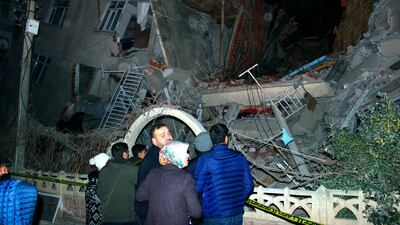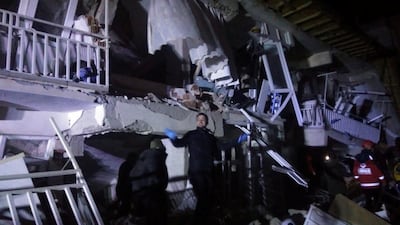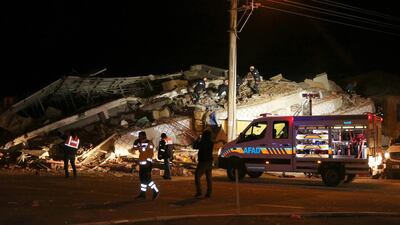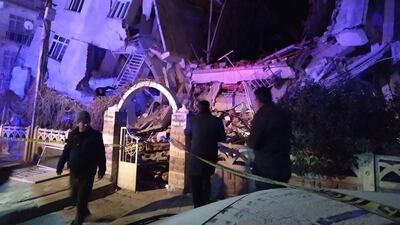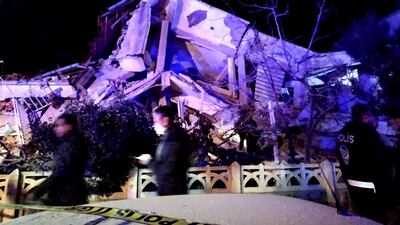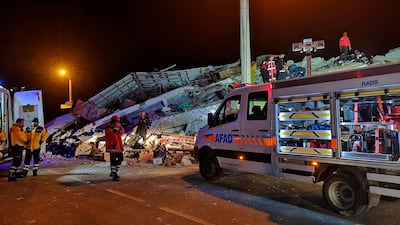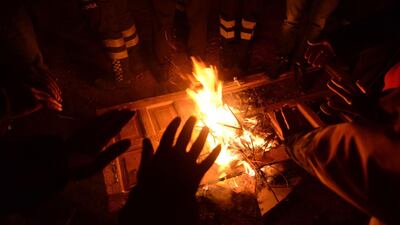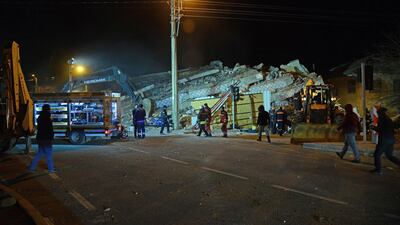Rescue workers raced against time Saturday to find survivors after a powerful 6.9 magnitude earthquake hit eastern Turkey, killing at least 29 people, injuring hundreds and causing buildings to collapse.
The quake struck late on Friday evening with the epicentre in the small lakeside town of Sivrice in Elazig province, and was felt across neighbouring countries.
Thirteen people were killed in the Elazig and five more in neighbouring Malatya, Health Minister Fahrettin Koca said after rushing to the region with other ministers to oversee the rescue operation.
President Recep Tayyip Erdogan cancelled a speech in Istanbul and headed to Elazig where he attended the funeral of a woman and her son.
He vowed the state would do "everything we can" to help those affected in a disaster he described as a "test".
"We stand by our people," Mr Erdogan said on Twitter, in his first comments on the incident.
Turkey's Interior Minister Suleyman Soylu said none of the 1,243 people injured were in critical condition.
Turkish news channels showed live images of people rescued. Among those found alive was a woman called Azize who had contacted emergency authorities and spoken to a rescue worker by telephone, state news agency Anadolu reported.
Tensions were high as one resident accused the government of lying.
"They [the government] claim that only four people are trapped under the rubble. It is not true. I have five relatives in that building," Suat, a 45-year-old butcher, said.
"There are four floors and three flats per floor. If there were five people per flat, do the math. Why are they lying?"
Suat described the moment when the quake struck as he was at home in another neighbourhood and his children "were screaming in terror".
The Ankara public prosecutor's office said it had begun an investigation into "provocative" social media posts but did not give further details.
Mr Erdogan also told citizens to "ignore gossip and negative propaganda".
Mr Soylu described the earthquake as a "Level 3" incident according to the country's emergency response plan, meaning that it called for a national response but did not require international help.
"We are hoping we will not have more casualties," Mr Soylu told the Anadolu news agency.
"Sivrice was shaken very seriously, we have directed our rescue teams to the region."
He said Turkey had learnt lessons from previous disasters which helped it address Friday's incident. Drones were sent out as part of search operations and to assist with communication between provinces.
Turkey's disaster and emergency management agency said the earthquake struck at around 8.55pm local time (1755 GMT), and Turkish aid organisations also said they were sending teams to the area.
Turkish television showed images of people stuck in apartments rushing outside in panic, as well as a fire on the roof of one building.
Footage also showed rescue teams searching for survivors trapped in a collapsed building in a village 30km from Elazig, and two people were pulled alive from the rubble.
Turkish communications companies said they would provide residents in the quake region with internet and free phone calls after phone lines and communications infrastructure sustained damage.
Hundreds of people were anxiously waiting on the other side of police barriers including a man who gave his name as Mustafa.
"I have three relatives in that building: one man, his wife and her mother. They are still under the rubble," the 40-year-old told AFP.
"I was home during the earthquake. It lasted for so long, it was like a nightmare. I froze in the living room when it happened, my wife and our two children were screaming and running around," he said.
He added that some neighbours jumped out of the windows in panic as families including his were forced to spend Friday night on the streets.
The Turkish Red Crescent called on residents of Elazig to give blood following the earthquake, as local media reports suggested some of those injured had been forced to leap from balconies to escape damaged buildings.
The quake, which struck at a depth of 6.7km, was followed by 401 aftershocks, 14 of which were above 4 in magnitute and the strongest measuring 5.4 and 5.1 on the Richter scale.
State media in neighbouring Syria and Iran both reported that the earthquake was felt in those countries. In Lebanon, local media said the cities of Beirut and Tripoli also felt the quake.
Social media users in Turkey posted videos showing buildings being shaken by the tremor.
Other users posted pictures of badly damaged buildings.
The town of Sivrice, home to about 4,000 people, is situated south of Elazig city on the shores of Lake Hazar. It is one of the most popular tourist spots in the region and the source of the Tigris river.
The lake is home to a "Sunken City" where archaeologists have found artefacts dating back 4,000 years.
Turkey lies on major fault lines and is prone to earthquakes.
In 1999, a devastating 7.4 magnitude earthquake hit Izmit in western Turkey, killing more than 17,000 people, including about 1,000 in the economic capital, Istanbul.
An earthquake with a magnitude 6 killed 51 people in Elazig in 2010.


